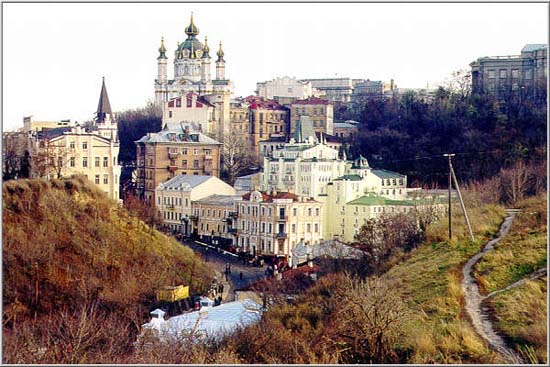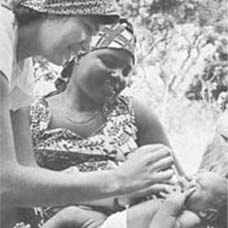
Megan Tetrick says "I stood waiting standing under the eaves of the apartment building in the dark and the rain for the trash truck to come, and listening to a babushka from Donbass argue with a retired man from Krasyliv, the small western central town in Ukraine where I serve as a Peace Corps volunteer"
IC grad sees Ukraine story up close
I stood waiting standing under the eaves of the apartment building in the dark and the rain for the trash truck to come, and listening to a babushka from Donbass argue with a retired man from Krasyliv, the small western central town in Ukraine where I serve as a Peace Corps volunteer. She paced back and forth on the melting snow, crowing at him in Russian, saying that life was better in the east, people more polite and compassionate.
She said they were Russians there, Ukrainians here. He said that there were all different nationalities -- Armenians, Romanians, all together. He spoke in Ukrainian, standing in one spot, asking her over and over if the elections were fair. "The elections should be just," he said. "Were you paid to say that?" she snapped, turning her back to him again.
Ukraine is on the brink of civil war, the headlines scream. A week ago, I thought the journalists were all jumping the gun. Most of the insanity was happening in Kyiv and a few other major cities, but I am blessed to live in a rural town where things have been calm, and remain so despite sparring between neighbors.
My Ukrainian tutor tells me that people here will talk and talk, but they won't leave their state-owned apartment blocks for tent city in Kyiv.
The country, however, like my neighbors say, is clearly split into West and East, red oblasts for Yushchenko, green oblasts for Yanukovich.
Two uneven puzzle pieces snapped together on the world map as a country that sought independence from various invaders for hundreds of years, and finally had it almost dropped into their hands in 1991, after the fall of the Soviet Union.
Victory came peacefully to Ukraine, without the bitter struggles seen in the northern republics. But united as one they were not.
The westernmost oblasts were pulled into the fold of the U.S.S.R. late, only in 1942. There, you're more likely to hear Polish, Hungarian, or Romanian than Russian. There people trade with Europe, while in the East they trade with Russia.
The heavy stamp of communistic sameness didn't reach to the Carpathians, where few, if any, of the dreary Soviet-style apartment blocks so ubiquitous in the rest of the country can be found. Abandoned military factories are also absent -- instead there are working logging factories, resorts and summer camps. But while here in the not-quite-West (the distinction is more cultural than geographical), people are not striking, rallying daily, and leaving in bus loads for Kyiv as they are in the West, people are not indifferent. All are glued to their television sets for two hours after 11 at night, and again from 6 a.m. to 9 a.m. when Era, one of two television channels they trust, is on the air.
The only topic of conversation is politics, from the teacher's room to Bible study groups. All other topics are digressions.
Fluorescent orange ribbons (Yushchenko's signature color -- brilliant choice) fly from the trees like alien winter leaves.
They're tied around arms, necks, hair, purses, rearview mirrors in cars -- even dogs have been spotted with them. Orange was fashionable before, but now it's almost the new black.
Yet the snowball fights between my school and the neighboring school were far wilder than the rallies for Yushchenko, though the halls afterward echo with students chanting "Yu-shchen-ko, Yu-shchen-ko." I heard one as I was walking to school, the fiery words of a man with a megaphone bounced off the nine-story apartment buildings a few blocks away, creating an eerie, faceless echo.
There's been a rally about every other day, sending an unusual surge of energy through the sleepy town, but people seem more excited than angry most of the time.
A little girl headed for a Saturday afternoon rally in the center of town held her mother's hand, and two orange ribbons tied in bows on her winter hat stood up like bunny ears. In the oblast center, just half an hour away, there have been huge rallies every day where hungry students are fed hot pies and oranges are passed out like party favors.
Orange banners fly, cheers echo on the streets, horns honking in support. Some students are traveling to Kyiv, abandoning their studies to stand in the cold and wait.
Ukrainians are good at waiting. When the lights go out, they grab the candles that are always at hand and continue with their chores. When a bus simply doesn't arrive at the station for no clear reason, they wait for the next one, hardly complaining. When they finally gained independence, they went for months without salaries, waiting for their new country's economy to stabilize.
Nearly all are paid salaries every month now, but no one lives on their professional salary alone. Family members work abroad and send money home, relatives in villages toil in the fields with only hand-held instruments to put food on the table, and wives work some days at school, some days at the market, to clothe their children and themselves.
There is a Ukrainian saying, "My home is on the edge; I don't know anything."
For years, many turned their backs on politics, simply doing the best they could for themselves in their own little villages and towns. And in my town, they continue their daily routines, taking a few hours to rally in the center, only to turn around and go home again. But today, many other Ukrainians are leaving their homes, and going to the center because they know something.
They aren't going to wait anymore.
Megan Tetrick is a former copy editor at The Ithaca Journal with a 2003 bachelor's degree in journalism and politics from Ithaca College. She is working in Kyiv, during her second year as a Peace Corps volunteer. Her hometown is Noblesville, Ind.
Email this story
Originally published Friday, December 10, 2004








